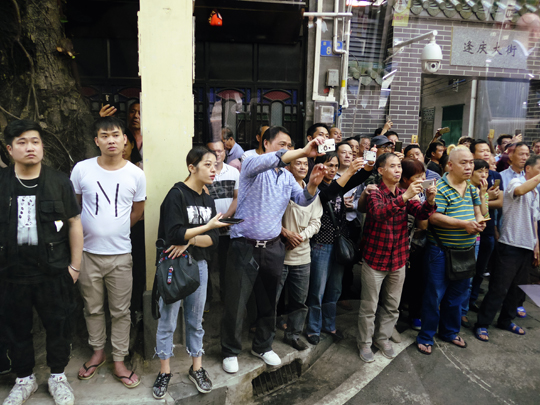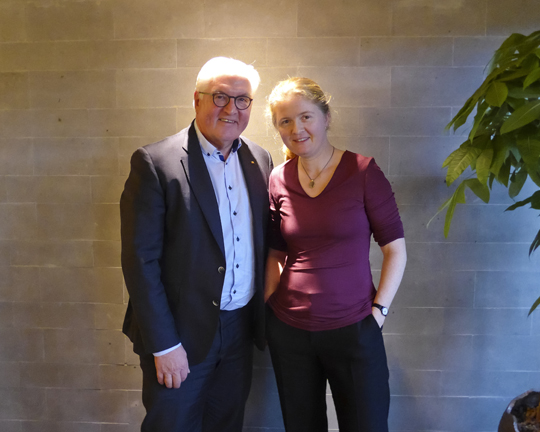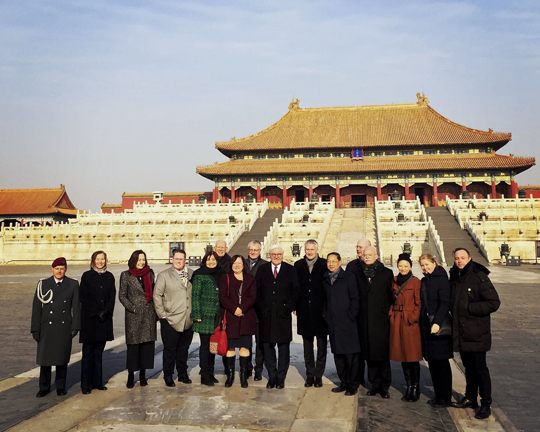Traveling in a Bubble
Freiburg, Jan 18, 2019
The invitation came out of the blue, just two weeks before the departure date: in December 2018, Lena Henningsen, junior professor at the Institution of Sinology at the University of Freiburg, was a member of the delegation that accompanied the German President Frank-Walter Steinmeier on a state visit to the People’s Republic of China. In conversation with Alice Tátrai-Gruda Henningsen describes her impressions, evaluates the German-Chinese relationship, and explains why in politics speaking softly can be more effective.

Snapshots at the roadside: onlookers greet the German President. Photo: Lena Henningsen
Ms Henningsen, how did you come to be a member of the delegation?
Lena Henningsen: It came out of the blue for me: two weeks before the departure date I received a highly official, formal invitation. Naturally the preparations to find suitable participants take far longer. It was important to Mr Steinmeier to put together a cultural delegation. In the end, there was a handful of Sinologists and political scientists who deal with contemporary China. My work on culture and literature was the decisive factor.
What was your role as a member of the cultural delegation?
My colleagues and I held many talks with Mr Steinmeier’s team setting out and evaluating our impressions. Mr Steinmeier was also interested in our opinion of things. On certain issues, we academics plainly had different insights because by the nature of our work we travel a lot more in this country, and in different ways. In addition, we were there as an expert resource for the delegation and the press.
An official trip like this must demand very careful organization.
The trip was planned down to the last detail, and the schedules were adhered to precisely. We traveled in a convoy of about twenty cars. The police protection made it seem very eerie to us. When the German President was holding discussions there was sometimes an alternative program for delegation members. It’s certainly an all-inclusive package. But it results in you traveling in a massive bubble. Just two blocks away normal everyday life is carrying on the same as everywhere else in China. Yet Mr Steinmeier can’t simply go out to eat noodle soup. He can only get a glimpse of this everyday life.

Amongst other things, Lena Henningsen and German President Frank-Walter Steinmeier discussed the consequences of the digital revolution in China. Photo: Lena Henningsen
What were the ideas behind the state visit?
First of all, the German President wanted to highlight that the relationship between China and Germany is strong. Besides this, of course, the focus was on the social consequences of the digital revolution – an issue that is especially sensitive in China, because they are currently establishing a digital Big Brother state. The country is currently engaged in introducing a social credit system. This deploys sanctions in order to bring about good social conduct, which the population appear to be accepting positively. But privately it became clear that some Chinese are very critical of the policy. In his speech in Szechuan, Mr Steinmeier combined these two issues extremely well rhetorically: he emphasized that China had achieved a lot, from tackling poverty to better access to education. But he also highlighted the position of the German side: the right to freedom and human rights are indispensable.
How did the Chinese respond to the speech?
I was sitting next to a member of the political elite at a banquet in the evening. When I asked what he thought of the speech, he said, “It’s all right.” But his intonation made it clear that he did not agree with it at all. Chinese reports, as far as I could see, said nothing about the critical undertones. They only reported the German President’s praise for Chinese development. But who knows what a speech like that can do in the heads of those present. I think that people respond better to soft speech than a great moral cudgel.

Political scientists and Sinologists: the researchers were there to support the German President and the press. Photo: private
How do you rate the current German-Chinese relationship?
Nothing happens without China: the country is a strong economic, political and global power. China is a major trading partner for Germany, there is an exchange of knowledge and mutual esteem. But a lot is rhetoric, and some things simply aren’t shown to representatives of western governments, for example, the reeducation camp for the Muslim minority, the Uighur, in Xinjiang. Even as researchers we are currently experiencing a change in China: although just a few years ago we looked to the future with a certain optimism as regards a growing freedom of opinion, a number of colleagues are now finding that archives are shut in their face, field research is becoming impossible, and interview partners cancel appointments out of fear.
What can politics and trade do?
Leaders in politics and trade have to present their position cleverly and always persistently. There are always cracks and gaps in the system, despite the massive control, and we have to use them. And we also have to deal in shades of gray. The Chinese side likes to argue that China forbids involvement in its affairs. But shutting doors wouldn’t improve the situation. I’m convinced that it is important to keep talking. And of course it would help if European countries would develop a common - at least partially - strategy for China, so that China does not play them off against one another with bilateral agreements.

